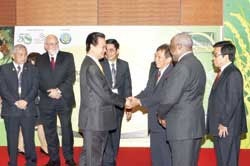International rice congress discusses food security
 |
| Prime Minister Nguyen Tan Dung meets heads of delegations to the 3rd International Rice Congress 2010 held yesterday in Ha Noi. - Photo Duc Tam |
Prime Minister Nguyen Tan Dung made the statement as he adressed the third International Rice Congress 2010 (IRC2010), "Rice for Future Generations", held in Hanoi yesterday.
Dung said rice played a particularly important role in global food security as it helped feed more than half the world's population. In 2009, the world rice area reached 161 million hectares, producing 679 million tonnes of rice.
"Its importance is especially significant in Asian countries—the world's largest rice producers and consumers and home to over 60 per cent of the world's poor," he said.
Director general of the International Rice Research Institute (IRRI) Robert Zeigler said the conference, which attracted 1,300 participants from more than 66 countries, would provide a forum for hundreds of the world's top rice scientists to discuss the latest breakthroughs.
"Projected demands for rice will surpass supply in the near to medium term unless something is done to reverse current trends of slow productivity growth and the inefficient, often unsustainable, management of natural resources," he said.
Agricultural Science Advisor for the World Bank Eija Pehu said 21st century research needed to be more collaborative than it had been to cope with diverse impacts on food production due to changes in rainfall patterns and the increased frequency and intensity of droughts and floods.
President of the United Nations' International Fund for Agricultural Development (IFAD) Kanayo Nwanze urged every nation to take immediate action by dramatically increasing their investment in agriculture to promote production growth.
Acting director of the Cornell University Institute of Public Administration Norman Uphoff said the Green Revolution, developed to industrialise agriculture over the later half of the 20th century, had lost momentum and that millions of poor people had been by-passed by the Green Revolution technologies that were input-dependent.
"Post-modern agriculture in the new century must be different in many ways from the last century because of many factual changes and trends, including the decline of arable land and water available for agriculture and rising energy costs," he said.
"It has to transform from energy-intensive and capital-intensive to science-based approaches," Uphoff said.
IRRI's Zeigler said the International Rice Policy and Investment Conference was incorporated in this year's programme for the first time to highlight the importance of sound policy and wise investment to future global food security.
Deputy director of Agricultural Development under the Bill & Melida Gates Foundation, Prabhu Pingali, said, "Technologies are important but what is really important when looking at the rice economy is how to encourage good policy-making to make sustainable production a reality."
People saw the 2008 food crisis as a wake up call, he said.
"Many nations in this region suddenly realised that they needed to do a lot more to enhance the future rice supply," said Pingali.
IFAD's Nwanze called for a commitment from young people of the developing world because if the groundwork for profitable rural enterprises is not laid, they will be driven to search for other opportunities in urban areas.
"If we allow this to happen, we will be left with no one to plough the fields that will feed the future," he said.
Vietnam's Minister of Agriculture and Rural Development Cao Duc Phat said that although Vietnam was the world's second largest rice exporter, it still faced the challenge of food security as the population grows, the area for agricultural production declines, and the threat of climate change rises.
Prime Minister Dung called for support from the international community to help Vietnam achieve efficient and sustainable rice production.
"This also means helping the world to achieve food security, since each year Vietnam contributes about one-fifth of the total global rice export."
Coinciding with the IRRI's 50th anniversary, IRC2010 in Vietnam was the largest and likely to be the most successful congress following the two preceding congresses in New Delhi 2006 and Beijing 2002.
What the stars mean:
★ Poor ★ ★ Promising ★★★ Good ★★★★ Very good ★★★★★ Exceptional
Related Contents
Latest News
More News
- Hermes joins Long Thanh cargo terminal development (February 04, 2026 | 15:59)
- SCG enhances production and distribution in Vietnam (February 04, 2026 | 08:00)
- UNIVACCO strengthens Asia expansion with Vietnam facility (February 03, 2026 | 08:00)
- Cai Mep Ha Port project wins approval with $1.95bn investment (February 02, 2026 | 16:17)
- Repositioning Vietnam in Asia’s manufacturing race (February 02, 2026 | 16:00)
- Manufacturing growth remains solid in early 2026 (February 02, 2026 | 15:28)
- Navigating venture capital trends across the continent (February 02, 2026 | 14:00)
- Motivations to achieve high growth (February 02, 2026 | 11:00)
- Capacity and regulations among British areas of expertise in IFCs (February 02, 2026 | 09:09)
- Transition underway in German investment across Vietnam (February 02, 2026 | 08:00)

 Tag:
Tag:




















 Mobile Version
Mobile Version